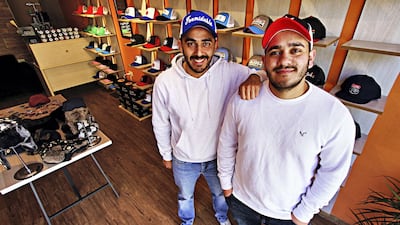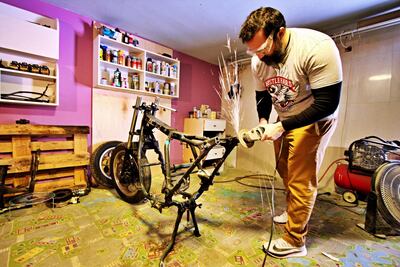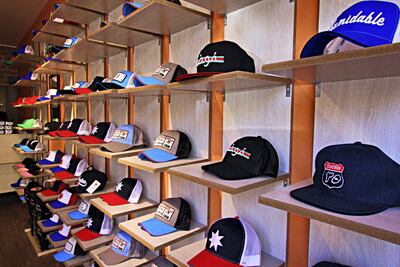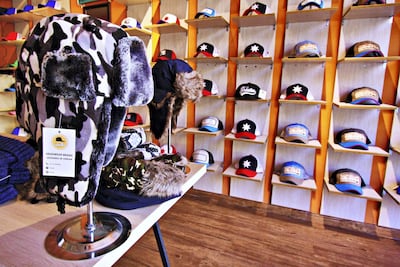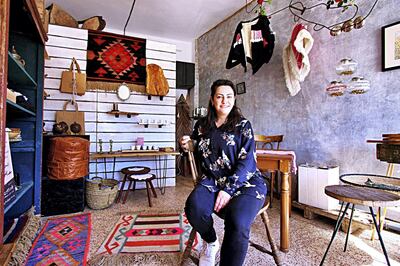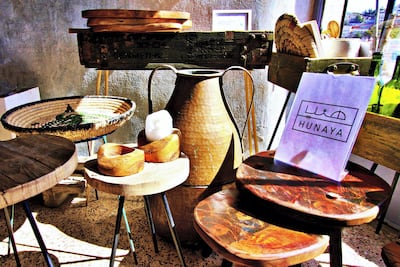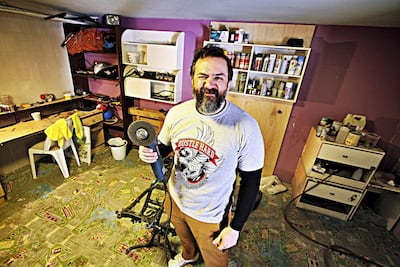Designers in Jordan are bravely breaking away from traditional expectations and are taking a risk in entrepreneurism, challenging stereotypes and paving the way to achieve independence through their artwork.
Artists in Amman are no longer settling for financial security and stable employment at established firms after gaining university degrees. Instead, they're launching their own businesses in the hope of filling a gap in the market, while promoting a culture of creativity in their country.
Tapping into that demand is no easy feat. In a country facing a tough economic climate and unemployment at 18.6 per cent, according to the latest figures from Jordan's Department of Statistics, the idea of taking financial risks can face fierce opposition.
The average monthly salary in Jordan is JOD439 (Dh2,274) after tax, while a single person living in Amman faces a potential monthly expense of JOD505, according to Numbeo, the world's largest database of living conditions and costs, a figure that doesn't even include rent.
Financial reliance on parents well into adulthood is widely accepted as a necessity. There is also a societal pressure, faced by men in particular, to earn a stable income to support their families, making the dream of becoming an entrepreneur unlikely.
But there are a few who are still up for the challenge.
Support for the indie movement
So, in an attempt to help brave local artisans overcome these challenges and turn their talents into successful business ventures, Jordanian creative start-up developer Dezain Space provides them with training and financial support.
"We help independent designers create a brand and our aim is for them to grow internationally," managing director Sima Najjar tells The National. "There are a lot of benefits to launching your product in Jordan – like the free-trade agreement with a number of Arab countries, for example."
Since its formation 18 months ago, the organisation has delivered three five-day workshops and supported 90 designers. It's funded through the Jordan Action for the Development of Enterprises project, which is sponsored by the European Union. "We recognised a lack of awareness in business management, so we focus on providing training in that area," says Najjar. "We try to show the designers how to push their work as a brand."
And if their Jordanian proteges are anything to go by, the organisation has had a very successful entry into a difficult market.
Hats off to Taqyeh
For example, located in central Amman, on a side road off Rainbow Street – popular among locals and tourists for its vibrant atmosphere and abundance of shops and cafes – is the trendy Taqyeh, a cap customising store run by childhood friends Hareth Hijazi and Abed Qwaider, who are among the designers Dezain Space has supported. With the store's minimalistic decor and brightly coloured walls proudly displaying various headgear styles, it's a shop-front that makes a statement in an otherwise traditional-looking street.
"This all started as a hobby while we were in college," Hijazi says. "We began with just JOD450 and customised one hat at a time, but we realised there was a demand and it grew into the business that it is now."
For JOD15 customers can select a style of cap, the embroidered design of their choice in either three or two dimensions and a single or multi-coloured font. Orders can be turned around in only 24 hours and the caps can be collected in-store or delivered. It has proven to be a very popular service, with a loyal fan base in Jordan's capital.
The duo, both aged 25, launched their business through social media in January 2017, before opening a physical store last March, a move that they say delivered a 30 per cent increase in sales. An official website and e-store also went live only two months ago. Now, the business sells about 70 hats per week – 60 per cent of which come through online sales – and as of this month, Taqyeh offers 350 different styles of hat – an endeavour that has required an investment of about JOD20,000.
"There are two options for most items here [in Amman]," Hijazi explains. "You can either have cheap and low quality, or hugely expensive, branded items. There is definitely a gap in the market for what we're doing."
Hijazi and Qwaider both sacrificed the security of good, well-paid jobs to concentrate on their business. Qwaider left his role as a product designer when the store first opened and Hijazi absconded his sales engineer position at LG Electronics last autumn, enabling him to dedicate more time to improving their brand's marketing and brand awareness strategy, which led to a 40 per cent increase in trade.
Hijazi admits that his parents found it difficult to come to terms with his decision. "It's hard for people here to understand the point of taking a risk to be self-employed – no one in my family has ever done it," he says.
Following the success of the business and Hijazi's clear determination to make it work, however, his family are beginning to be won round. Particularly since the duo are now focusing on their plans to expand to the Gulf through franchising.
"The mentality here is very focused on career progression," Hijazi says. "But I believe you need to take a little bit of a risk and we need more people willing to do this in Jordan. It would benefit all of us."
Fun in furniture
Just a short walk around the corner from the Taqyeh store, at the end of Rainbow Street, is Hunaya, a custom furniture business run by Nour Nsheiwat, 32. The small, sun-drenched bricks-and-mortar shop has a spectacular view overlooking the east of the city, as well as an eclectic selection of upcycled designs.
Nsheiwat scours junkyards in search of used items she can transform into covetable creations. "I try to keep the original essence of the pieces I find," she says. "I see what I do as a way of preserving the items while giving them a fresh story."
Nsheiwat started her business through Instagram four years ago, after quitting her career in communications. She now sells individual items, from candleholders to coffee tables, which she has customised and produced alongside other artisans, while also doing consultancy work through her brand for companies in the food and beverage sector. "I've realised that designing cafes and restaurant interiors, and creating food display items is my passion," says Nsheiwat.
A project she's particularly proud of is a restaurant in Berlin. "The owner's aim was to revive the Levantine culture, so they wanted furniture with a story," she explains. "Everything was created using upcycled materials; we made stools using old coat stands and planter boxes from wooden gun cases under the notion, 'from war to love'."
Her success hasn't come easy. From the age of 24, Nsheiwat worked her way through the ranks at Ikea, before being promoted to communication and interior design manager, responsible for a team of 30 people. She was the first Arab to be appointed to the position in any of the Swedish brand's stores worldwide. This experience provided her with invaluable skills she has since put to use in setting up her business in Amman.
In October, she transformed her own storage space into what is now a very charming shop, with the goal of attracting tourists – a decision that she says boosted sales by 15 per cent. On average, Hunaya sells about JOD35 worth of items per day, but during Christmas last year she made a JOD1,500 profit.

Now, Nsheiwat is even more convinced that artisans should take the plunge into entrepreneurism and she's become passionate about inspiring further innovation among other brave individual. "It's the independent stores that add life and soul to the city," she says. "And it's genuine, Jordan-made products that tourists seek out as souvenirs during their travels."
Yet the concept of female entrepreneurs is an idea that Jordan is still adjusting to. It's not only Nsheiwat running her own company that turns heads, but its also her flouting of cultural norms when it comes to her junkyard visits – places typically deemed as unsafe and inappropriate for women. "I think I've changed people's perceptions here," she says.
A radical move
Over in the west of the city, in a house that exudes creativity, Nader Hammouqah, 34, runs his custom design company Sick Radicals. In his lovingly decorated home, canvases he's painted decorate the walls; above the fireplace sits a modern take on the Arabic calligraphy movement created with thin pieces of wood; and in the living room Hammouqah points out lamps made by his wife, Malak, using table legs.
Downstairs is his workshop, where an angle grinder and blowtorch add a whole different dimension to the design process. "I've been into illustration since I was a kid," says Hammouqah, who also teaches animation, illustration, typography and calligraphy at the German Jordanian University in Amman. "I always wanted to have my own line of T-shirts."
Last year, thanks to support from Dezain Space, his dream became a reality. Now, Hammouqah's intricate streetwear-inspired designs stretch far beyond T-shirts – his talents have spilled out to shoes, jackets, key rings, stickers, motorbike helmets and even motorbikes. "Social media is fuelling people's desire to buy the coolest, newest things and this streetwear style is a growing trend, especially in this region," Hammouqah explains.

Last month, Hammouqah took his brand global, partnering with Dubai-based online store El Botik, which delivers his products worldwide. He also sells his T-shirts in local shops and customises pieces for individual clients. All of this earns him about JOD350 per month. But this is only the beginning for Sick Radicals.
“People told me there’s no market here for this kind of stuff, you should move abroad,” says Hammouqah, who instead chose to stay put and be a part of the growing number of artisans committed to driving innovation in Jordan. “There is a movement getting under way. I see a lot of students who are experimenting with their own designs and I’ve had many approach me for advice.”
All three designers paint no illusions about the struggles of running their own businesses; financial instability, long hours and little time off are only some factors that impact on their lives away from their work, but all of them agree the benefits make it a risk worth taking.
“There are so many challenges,” Hammouqah admits. “But when you stand back and look at what you’ve achieved and you realise exactly what you’re capable of, it’s really an incredible feeling.”
